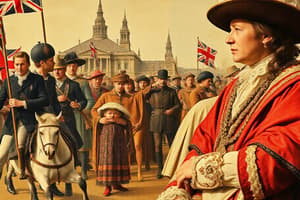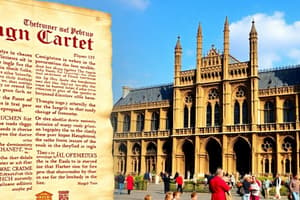Podcast
Questions and Answers
What was one of Ivan the Terrible's notable characteristics as the first tsar of Russia?
What was one of Ivan the Terrible's notable characteristics as the first tsar of Russia?
- He promoted the arts and education.
- He was known for his cruelty and tyranny. (correct)
- He established democratic principles.
- He modernized the military.
Which of the following best describes the Baroque style?
Which of the following best describes the Baroque style?
- Minimalist and subdued
- Geometric and symmetrical
- Extravagant, dramatic, and colorful (correct)
- Ornate but monochromatic
What theory did Nicolaus Copernicus propose that challenged geocentric views?
What theory did Nicolaus Copernicus propose that challenged geocentric views?
- Heliocentric theory (correct)
- Theory of relativity
- Laws of thermodynamics
- Quantum mechanics
Which Enlightenment philosopher is known for arguing against the divine right of kings?
Which Enlightenment philosopher is known for arguing against the divine right of kings?
Which major contribution did Isaac Newton make to scientific thought?
Which major contribution did Isaac Newton make to scientific thought?
What was the primary focus of Enlightenment thinkers regarding society?
What was the primary focus of Enlightenment thinkers regarding society?
Which of the following philosophers is known for criticizing intolerance and superstition?
Which of the following philosophers is known for criticizing intolerance and superstition?
Which ruler is credited with significant modernization in Russia through Western adoption?
Which ruler is credited with significant modernization in Russia through Western adoption?
What was a significant outcome of Charles I's reign?
What was a significant outcome of Charles I's reign?
Which event is associated with Oliver Cromwell?
Which event is associated with Oliver Cromwell?
What role did James II play in English history?
What role did James II play in English history?
What was a key feature of the English Bill of Rights accepted by William and Mary?
What was a key feature of the English Bill of Rights accepted by William and Mary?
What characterized Louis XIV's rule in France?
What characterized Louis XIV's rule in France?
What distinguishes Frederick the Great of Prussia as an enlightened despot?
What distinguishes Frederick the Great of Prussia as an enlightened despot?
Which of the following statements about the English Civil War is true?
Which of the following statements about the English Civil War is true?
What was a significant consequence of Louis XIV's lavish spending?
What was a significant consequence of Louis XIV's lavish spending?
Flashcards
English Civil War
English Civil War
A conflict between the Roundheads (Parliament supporters) and Cavaliers (Royalists) in England.
Charles I's execution
Charles I's execution
Charles I was beheaded in 1649, declared a tyrant and enemy of the nation.
Oliver Cromwell's role
Oliver Cromwell's role
Led the New Model Army and became the leader of the Commonwealth (Republic) after Charles I's execution.
Restoration (1660)
Restoration (1660)
Signup and view all the flashcards
Glorious Revolution
Glorious Revolution
Signup and view all the flashcards
English Bill of Rights
English Bill of Rights
Signup and view all the flashcards
Louis XIV's Absolute Monarchy
Louis XIV's Absolute Monarchy
Signup and view all the flashcards
Enlightened Despot
Enlightened Despot
Signup and view all the flashcards
Ivan the Terrible's Reign
Ivan the Terrible's Reign
Signup and view all the flashcards
Peter the Great's Reforms
Peter the Great's Reforms
Signup and view all the flashcards
Scientific Revolution
Scientific Revolution
Signup and view all the flashcards
Heliocentric Theory
Heliocentric Theory
Signup and view all the flashcards
Scientific Method
Scientific Method
Signup and view all the flashcards
Enlightenment
Enlightenment
Signup and view all the flashcards
Thomas Hobbes's Ideas
Thomas Hobbes's Ideas
Signup and view all the flashcards
John Locke's Natural Rights
John Locke's Natural Rights
Signup and view all the flashcards
Study Notes
English Monarchy Key Events
- Charles I (1629-1649): Ruled alone for 11 years after dismissing Parliament. Recalled Parliament in 1640 for funds, triggering the English Civil War (1642). Executed in 1649.
- Oliver Cromwell (1599-1658): Led Parliament's forces in the English Civil War. Became leader of the Commonwealth after Charles I's death. Ruled as Lord Protector until his death in 1658.
- Charles II (1660-1685): Monarchy restored in 1660 (The Restoration). His reign was relatively stable after the Civil War. Died in 1685, succeeded by James II.
- James II (1685-1688): Catholic king whose policies created conflict with Protestants. Overthrown during the Glorious Revolution (1688) by William of Orange.
- William and Mary (1689-1702): Became monarchs following James II's overthrow. Accepted the English Bill of Rights, limiting royal power and strengthening Parliament's.
Absolute Monarchy and Its Impact
- Louis XIV (1643-1715): Known as the "Sun King," epitomized absolute monarchy. Moved French capital to Versailles to control nobility. His reign saw expanded military, but lavish spending caused hardship for commoners. Famous adage: "L'état, c'est moi" ("I am the state").
- Frederick the Great of Prussia (1712-1786): Enlightened despot who modernized Prussia's army and government. Advocated for enlightened rule while maintaining autocratic control.
- Ivan the Terrible (1533-1584): First tsar of Russia, known for cruelty and tyranny.
- Peter the Great (1672-1725): Modernized Russia by adopting Western culture and technology. Expanded Russian military and infrastructure (roads, canals).
Baroque Art and Music
- Baroque style: Extravagant, dramatic, and colorful art and music.
- Johann Sebastian Bach: Prominent Baroque composer.
- Wolfgang Amadeus Mozart & Ludwig van Beethoven: Transitioned to Classical music from Baroque.
Scientific Revolution
- Nicolaus Copernicus: Proposed the heliocentric model of the solar system.
- Galileo Galilei: Supported Copernicus and developed the telescope.
- Francis Bacon: Contributed to the scientific method.
- Isaac Newton: Formulated the law of gravity.
The Enlightenment
- Enlightenment: Intellectual movement emphasizing reason, individualism, and skepticism.
- Philosophers: Used reason and scientific method to improve society, leading to significant political/social changes.
Enlightenment Philosophers and Their Ideas
- Thomas Hobbes: Advocated for absolute monarchy to prevent civil war.
- John Locke: Challenged the divine right, argued for natural rights and government by consent (basis of modern democracy).
- Voltaire: Vocal critic of intolerance, tyranny, and superstition.
- Montesquieu: Explored concepts of separation of powers.
- Jean-Jacques Rousseau: Emphasized social contract theory.
- Mary Wollstonecraft: Advocated for women's rights.
- Denis Diderot: Edited the Encyclopédie.
- Adam Smith: Developed economic theories.
Studying That Suits You
Use AI to generate personalized quizzes and flashcards to suit your learning preferences.




